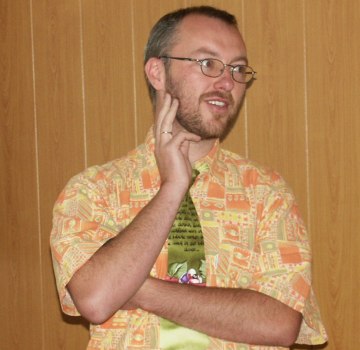| home | research | publication | persons | referencesdb | contacts |
![]()

Philippe Schmitt-Kopplin
E-mail:
schmitt-kopplin@gsf.de
Work adress:
GSF Institute of Ecological Chemistry, Ingolstaedter Landstrasse 1,
D-85758 Neuherberg, Germany
Web site:
http://www.gsf.de/ioec/biogeomics/person/schmitt-kopplin.php
Resume:
Philippe Schmitt-Kopplin received his MSc degree in agronomic sciences as well as his "Ingenieur Agronome" Diploma from the Institut Polytechnique de Lorraine (INPL) in Nancy France of in 1990. He then worked at the Institute of Ecological Chemistry-IOC/GSF and Technische Universitat Muenchen (TUM) in Munich from which he obtained his Ph.D. (1995) in agronomic sciences under direction of Prof. A. Kettrup. In 1995-1996 he was a postdoctoral research fellow from the National Research Council (NRC) with Dr. A.W. Garrison at the US-Environmental Protection Agency in Athens Georgia / USA and worked on chiral separations of pollutants with capillary separation techniques (CE, GC). 1996 he came back to IOC/GSF Munich as a young research scientist. 1996 he obtained his Docteur de L?INPL. 1999 he started teaching ecological chemistry and analytical chemistry at TUM Munich. Since 2001 he is group leader with a research focus (i) on capillary separation techniques coupled to mass spectrometry, (ii) on Fourier transform ion cyclotron mass spectrometry (FT/ICR-MS - in June 2005, a 12 Tesla FT/ICR-MS ApexQ System from Bruker Daltonics was installed in his group), (iii) expertise in the group on multidimensional nuclear magnetic resonance spectroscopy (NMR), all applied for metabolomic studies in projects in the fields of Environment and Health. 2002 he habilitated at the TUM in Ecological Chemistry and Environmental Analysis. Dr. Schmitt-Kopplin has been an active researcher in the field of capillary separation sciences with particular emphasis on the coupling to mass spectrometry. He has published over 80 publications including many book chapters and reviews. He participates on the Editorial Board of the journal Electrophoresis with an annual special issue on "capillary electrophoresis coupled to mass spectrometry" and is associate editor of the journal Environmental Chemistry Letters, guest editor for a special issue on FTICR MS in Analytical Bioanalytical Chemistry. His research efforts are focused on the development of new and powerful research tools enabling the targeted and non targeted analysis of/in complex mixtures such as in metabolomics and the structural investigation of non-repetitive structures such as humic-like materials from different environments.
![]()
| home | research | publication | persons | referencesdb | contacts |